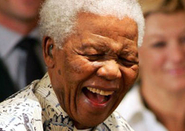Andrew Anglin
Daily Stormer
December 8, 2013

You can pretty well count on Jews to brag about every evil thing they do. It is a part of their racial psychology, that they need to celebrate their achievements in destroying everything good.
They brag about how they run the entertainment media and porno to destroy Christian White society, they brag about how they created communism, they brag about how they manipulate and control our governments.
Today, the Jewish Telegraph Agency is bragging about how the terrorist serial killer Nelson Mandela never could have been successful without their support.
Here you go.
In the early 1940s, at a time when it was virtually impossible for a South African of color to secure a professional apprenticeship, the Jewish law firm Witkin, Sidelsky and Eidelman gave a young black man a job as a clerk.
It was among the first encounters in what would become a lifelong relationship between Nelson Mandela and South Africa’s tiny Jewish community, impacting the statesman’s life at several defining moments — from his arrival in Johannesburg from the rural Transkei region as a young man to his years of struggle, imprisonment and ascension to the presidency.
Mandela, who died Thursday at 95, wrote of the early job in his autobiography, “Long Walk to Freedom,” and acknowledged the disproportionate role that Jews played in the struggle against apartheid. Lazer Sidelsky, one of the firm’s partners, treated him with “enormous kindness” and was among the first whites to treat him with respect.
“I have found Jews to be more broad-minded than most whites on issues of race and politics, perhaps because they themselves have historically been victims of prejudice,” Mandela wrote.
South Africa’s Jews remembered Mandela, the country’s first democratically elected president, as a close friend, one with deep ties to prominent community figures and a partner in the decades-long effort to end apartheid.
“I was extremely privileged to lead the community during his presidency,” said Mervyn Smith, who was chairman and later president of the South African Jewish Board of Deputies, the community’s representative body. “We met with him on many occasions and the talk was direct and open.”
For Mandela, who rose to prominence as a leading opponent of the discriminatory racial regime known as apartheid, Jews were vital allies. Jewish lawyers represented him in multiple trials, and Jewish activists and political figures played leading roles in the fight.
But Mandela’s ties to prominent South African Jews were personal as well as political. The former president’s second marriage, to Winnie Madikizela in 1958, took place at the home of Ray Harmel, a Jewish anti-apartheid activist. Harmel made Winnie’s wedding dress at Mandela’s request, according to David Saks’ history “Jewish Memories of Mandela.”
When Mandela married again, in 1998, he invited Chief Rabbi Cyril Harris to offer a private blessing on the nuptials that were scheduled to take place on Shabbat.
“After a warm exchange of greetings, Rabbi Cyril spoke quietly to them and blessed them,” Cyril’s wife, Ann, wrote later. “They stood through the blessing holding hands and with eyes closed. One could almost imagine the huppah.”
Nelson Rolihlahla Mandela was born in 1918 in the village of Mvezo, in the southeastern part of the country. As a young lawyer he was active in the African National Congress, which was beginning to challenge laws it considered unjust and discriminatory.
In the 1950s, Mandela was tried for treason. He was acquitted with the help of a defense team led by Israel Maisels. Several years later, when he was accused of attempting to overthrow the apartheid regime during the Rivonia Trial, Mandela was defended by several Jewish lawyers.
Mandela was found guilty and sentenced to life in prison in 1964. He served most of his sentence on Robben Island, a former leper colony off the coast of Cape Town. The legendary, feisty Jewish parliamentarian Helen Suzman visited him there. Another prison visitor was the journalist Benjamin Pogrund, who worked frequently with Mandela in the 1960s.
In a 1986 visit at Pollsmoor Prison, Pogrund informed Mandela that his son would shortly be celebrating his bar mitzvah. Afterward, the boy received a personal note from the future president.
“From a man serving a life sentence — and at that stage with no idea when he might be released — it was a kind and thoughtful action for a youngster he had not even met,” Pogrund said, according to Saks.
Mandela was released after 27 years, in February 1990. Four years later he was elected president. Among his appointees was Arthur Chaskalson, a member of his defense team during the Rivonia Trial, as the first president of the new Constitutional Court; he later became chief justice.
Mandela’s deep ties to the Jewish community continued during his political career. On the first Shabbat after his election, he visited the Marais Road synagogue in Sea Point.
“Almost his first celebration was with the Jewish community,” Smith told JTA.
